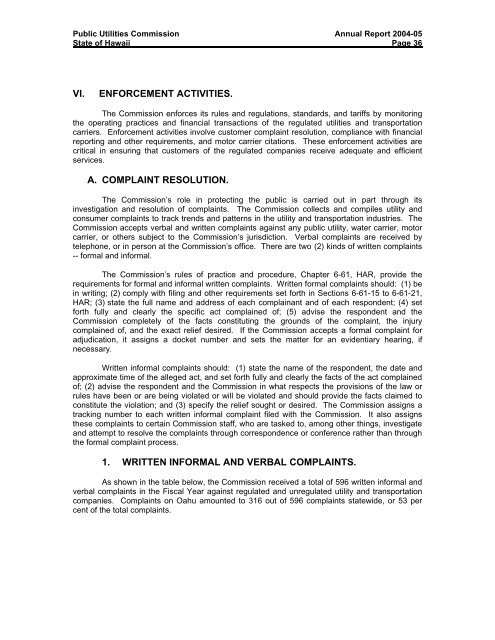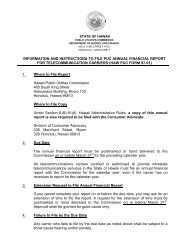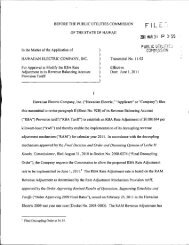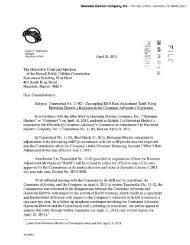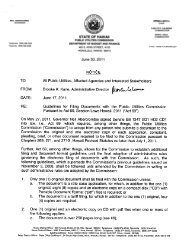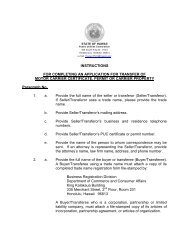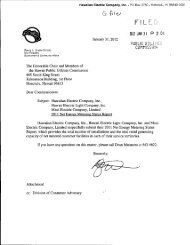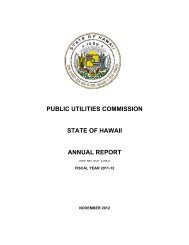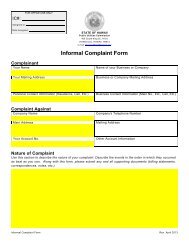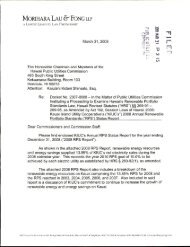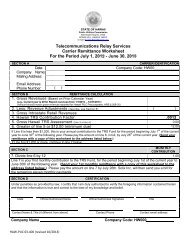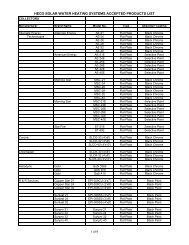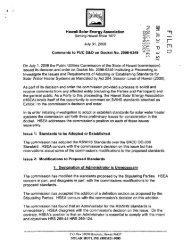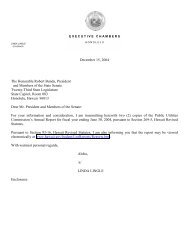PUC Annual ReportâFiscal Year 2004-05 - Public Utilities Commission
PUC Annual ReportâFiscal Year 2004-05 - Public Utilities Commission
PUC Annual ReportâFiscal Year 2004-05 - Public Utilities Commission
You also want an ePaper? Increase the reach of your titles
YUMPU automatically turns print PDFs into web optimized ePapers that Google loves.
<strong>Public</strong> <strong>Utilities</strong> <strong>Commission</strong> <strong>Annual</strong> Report <strong>2004</strong>-<strong>05</strong>State of Hawaii Page 36VI.ENFORCEMENT ACTIVITIES.The <strong>Commission</strong> enforces its rules and regulations, standards, and tariffs by monitoringthe operating practices and financial transactions of the regulated utilities and transportationcarriers. Enforcement activities involve customer complaint resolution, compliance with financialreporting and other requirements, and motor carrier citations. These enforcement activities arecritical in ensuring that customers of the regulated companies receive adequate and efficientservices.A. COMPLAINT RESOLUTION.The <strong>Commission</strong>’s role in protecting the public is carried out in part through itsinvestigation and resolution of complaints. The <strong>Commission</strong> collects and compiles utility andconsumer complaints to track trends and patterns in the utility and transportation industries. The<strong>Commission</strong> accepts verbal and written complaints against any public utility, water carrier, motorcarrier, or others subject to the <strong>Commission</strong>’s jurisdiction. Verbal complaints are received bytelephone, or in person at the <strong>Commission</strong>’s office. There are two (2) kinds of written complaints-- formal and informal.The <strong>Commission</strong>’s rules of practice and procedure, Chapter 6-61, HAR, provide therequirements for formal and informal written complaints. Written formal complaints should: (1) bein writing; (2) comply with filing and other requirements set forth in Sections 6-61-15 to 6-61-21,HAR; (3) state the full name and address of each complainant and of each respondent; (4) setforth fully and clearly the specific act complained of; (5) advise the respondent and the<strong>Commission</strong> completely of the facts constituting the grounds of the complaint, the injurycomplained of, and the exact relief desired. If the <strong>Commission</strong> accepts a formal complaint foradjudication, it assigns a docket number and sets the matter for an evidentiary hearing, ifnecessary.Written informal complaints should: (1) state the name of the respondent, the date andapproximate time of the alleged act, and set forth fully and clearly the facts of the act complainedof; (2) advise the respondent and the <strong>Commission</strong> in what respects the provisions of the law orrules have been or are being violated or will be violated and should provide the facts claimed toconstitute the violation; and (3) specify the relief sought or desired. The <strong>Commission</strong> assigns atracking number to each written informal complaint filed with the <strong>Commission</strong>. It also assignsthese complaints to certain <strong>Commission</strong> staff, who are tasked to, among other things, investigateand attempt to resolve the complaints through correspondence or conference rather than throughthe formal complaint process.1. WRITTEN INFORMAL AND VERBAL COMPLAINTS.As shown in the table below, the <strong>Commission</strong> received a total of 596 written informal andverbal complaints in the Fiscal <strong>Year</strong> against regulated and unregulated utility and transportationcompanies. Complaints on Oahu amounted to 316 out of 596 complaints statewide, or 53 percent of the total complaints.


